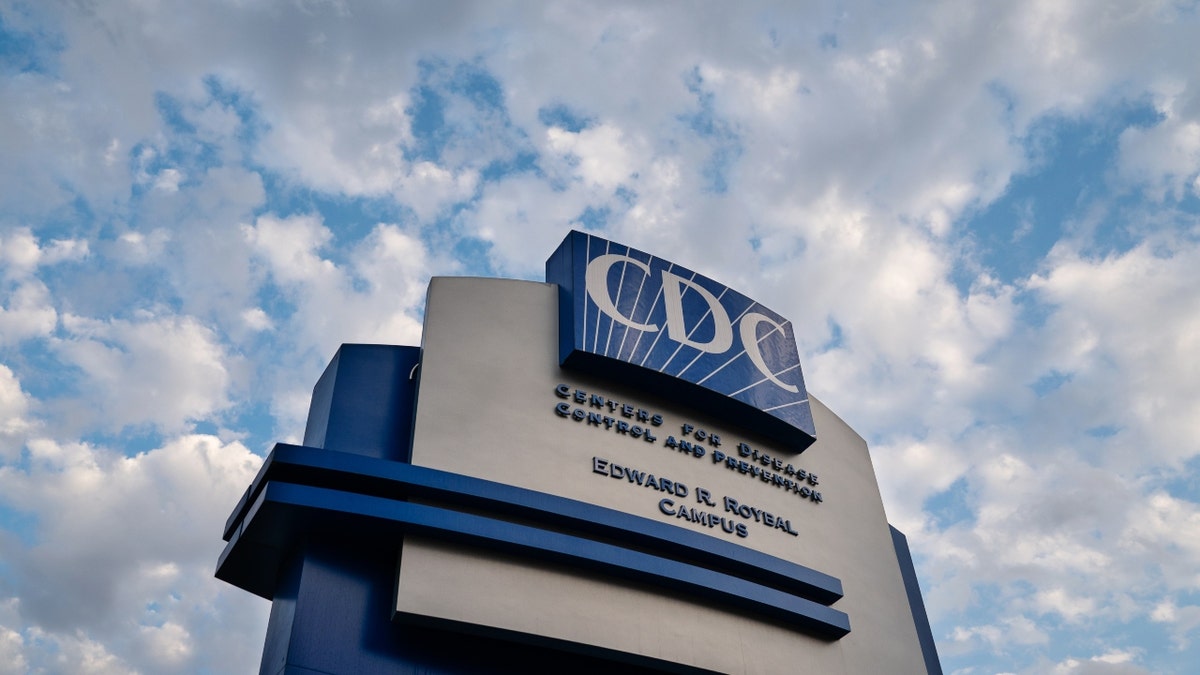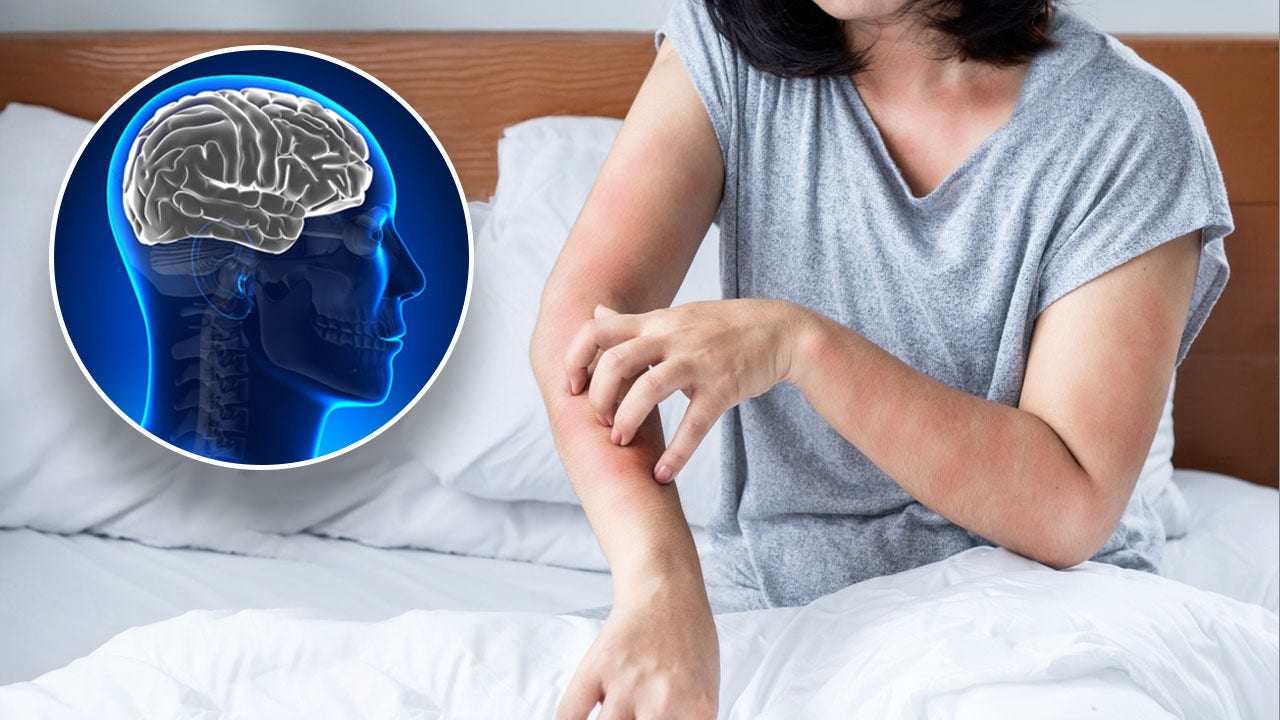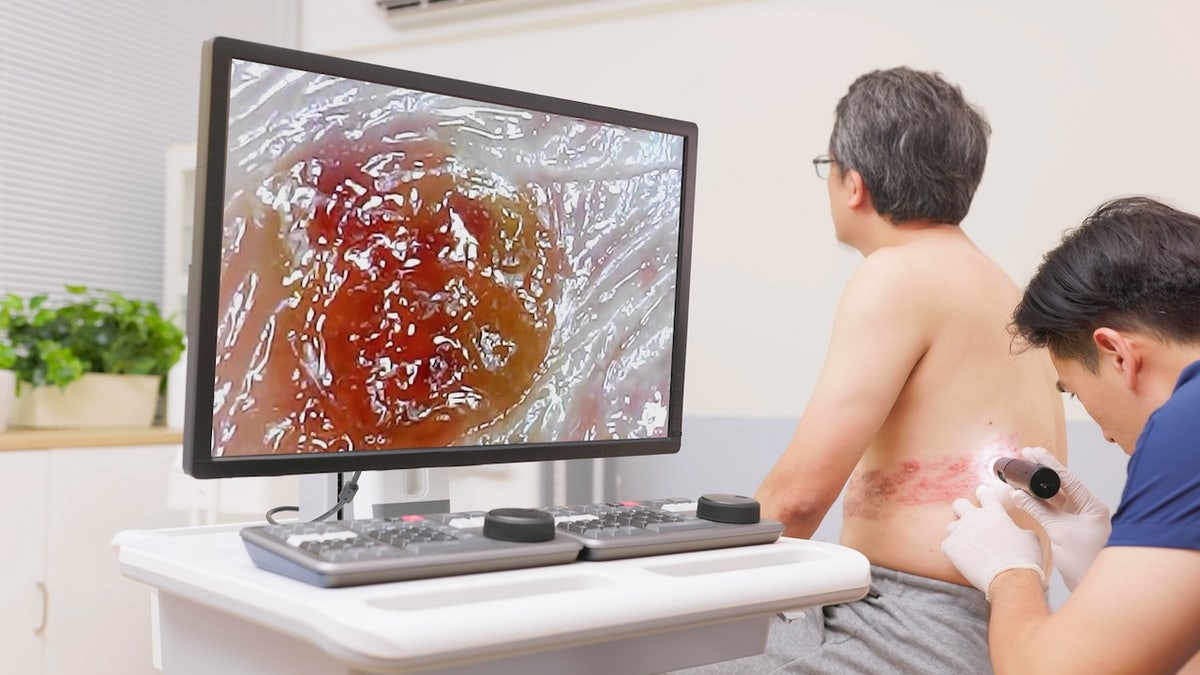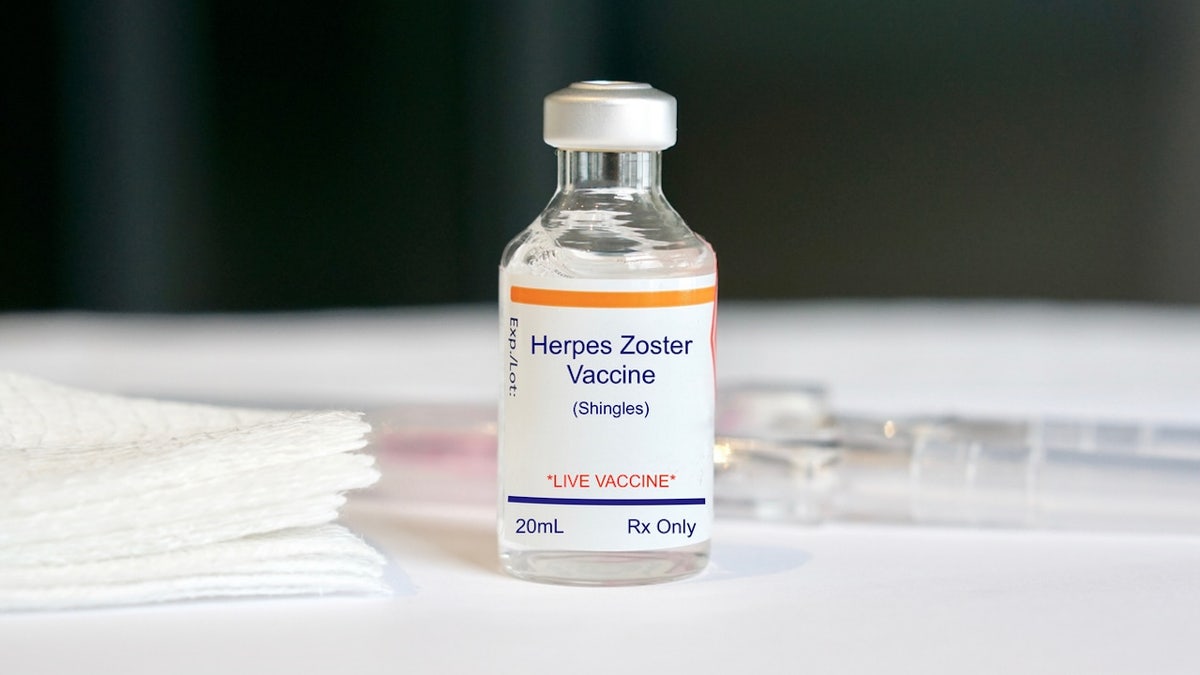Health
Thriving with anxiety: Expert tips on embracing the mental health condition

Facing anxiety head-on and approaching it differently can enhance your life.
That’s according to David H. Rosmarin, PhD, a psychologist and associate professor at Harvard Medical School, who delivers the advice in his new book, “Thriving with Anxiety: 9 Tools to Make Your Anxiety Work for You.”
Rosmarin shared with Fox News Digital that overcoming his own journey with anxiety allowed him to better help others.
NAVIGATING 2024 WITH STRATEGIES TAILORED FOR THOSE SUFFERING FROM ANXIETY, DEPRESSION, ADHD
In “Thriving with Anxiety,” he writes that he unexpectedly found himself suffering from the disorder as he set up an anxiety clinic in New York City in 2011.
He had already established a name for himself in Boston, but was struggling to get patient referrals in New York while facing mounting expenses and a tough commute between the two cities.
David H. Rosmarin, PhD, recently released a book called “Thriving with Anxiety: 9 Tools to Make Your Anxiety Work for You.” (Anthony Randazza/The Center for Anxiety)
Rosmarin writes, “A wave of anxiety swept over me. This was followed quickly by a sense of self-criticism for being hypocritical, followed by a surge of catastrophic thinking.”
He describes feeling embarrassed and “headed for failure” — wondering how he could help people overcome their anxiety when he was suffering from it himself.
7 HEALTHY LIFESTYLE CHANGES THAT COULD HELP REDUCE RISK OF DEPRESSION, SAYS STUDY: ‘ENORMOUS BENEFITS’
“Judging yourself for feeling anxious is like beating someone up when they are on the floor in order to get them to stand,” he said.
But he found a way to become more conscientious about making healthy lifestyle choices – eating more nutritious foods, exercising more frequently, and opening up to others about his challenges.
Hidden benefits of anxiety
People who have anxiety are often conscientious and driven, which can help prime them for leadership roles, the book notes.
Having anxiety can also lead to greater understanding and self-acceptance, according to Rosamarin.

Rosmarin is shown speaking at the Center for Anxiety’s fall retreat in New York on Oct. 18, 2023. (The Center for Anxiety)
Anxiety can also lead to empathy, he told Fox News Digital.
“When someone has been through the depths of difficulty, they can see the struggle on another person’s face,” Rosmarin said.
10 NATURAL WAYS TO MANAGE ANXIETY
“They understand what it means to feel uncomfortable, and it can create that compassion.”
Anxiety is not a malady, he said, but “a normal human emotion that we all experience, and we can use it to improve our inner strength, our relationships with others and our spiritual lives.”
5 tips for managing anxiety
Rosmarin offered the following tips for making the most of anxiety.
1. Lean into it
Instead of trying to avoid anxiety, the key is to face or even embrace it, he said.
“We can criticize ourselves for feeling anxious, get upset about it, run away from it … or we can lean into it,” Rosmarin said.
This requires a “healthy dose of self-compassion,” he said — and a recognition that part of being human is feeling overwhelmed at times.

Rosmarin speaks at the Center for Anxiety’s fall retreat in New York on Oct. 18, 2023. “We can criticize ourselves for feeling anxious, get upset about it, run away from it … or we can lean into it,” he said. (The Center for Anxiety)
2. Practice positive self-talk
Rosmarin suggests in his book that people speak kindly to themselves, allow time away from upsetting situations, and avoid self-deprecating language.
“There are ways to build your physical strength and there are ways to build your emotional fortitude.”
When he changed his inner dialogue to speak more gently to himself, he became more self-aware and found the self-acceptance he needed to forge ahead, he writes.
3. Try exposure therapy
Exposure therapy, a mental health practice in which people face their fears, can also help them withstand adversity rather than let it control them, the psychologist said.
US SURGEON GENERAL ADVISORY NAMES PARENT STRESS AN ‘URGENT PUBLIC HEALTH ISSUE’
For example, if you are afraid of public speaking, Rosmarin recommends building resilience by raising your hand at a meeting, wearing something that draws attention to yourself, or even singing karaoke.

The psychologist, shown in inset, details how facing anxiety head-on and approaching it differently can enhance your life. (iStock; Anthony Randazza/The Center for Anxiety)
“You don’t have to do this, but you also don’t have to go to the gym and work out,” he said.
“There are ways to build your physical strength and there are ways to build your emotional fortitude.”
The goal of this practice is to get to the point where you don’t care anymore if you are anxious — and even though it’s uncomfortable, it’s not going to stop you, he said.
4. Share your fears
The next step is to share your fears with someone, if possible, and reassure yourself that the anxiety won’t last forever, Rosmarin told Fox News Digital.
“Embrace it … let it ride and let yourself feel the feelings,” he advised.

The expert suggests that people speak kindly, give themselves time away from upsetting situations and avoid self-deprecating language. (iStock)
5. Seek calm
The last step, which Rosmarin said is the most important, is to let go.
The psychologist mentioned that humans have a “built-in cooling system” called the “rest and digest” system — which helps the body calm down.
“We’re human beings, and we don’t have control over everything,” he noted.
“The more we accept that, the more serenity we can have.”
For more Lifestyle articles, visit www.foxnews/lifestyle
Rosmarin’s Center for Anxiety now operates clinics in three states, treating nearly 1,500 patients each year, he told Fox News Digital.
“Thriving with Anxiety: 9 Tools to Make Your Anxiety Work for You” is published by Harper Horizon.

Health
CDC on alert as 'Sloth fever' hits the US — a disease spread by travelers from Cuba and South America

The Centers for Disease Control and Prevention (CDC) on Tuesday reported 21 cases of Oropouche virus disease, also known as sloth fever, in travelers returning from Cuba.
Twenty cases have been reported in Florida and one in New York.
The disease is spread primarily through bites from midges and from some mosquitoes. Symptoms of the disease include headache, fever and muscle aches and joint pains, but the virus is rarely fatal.
PARVOVIRUS OR ‘SLAPPED CHEEK DISEASE’ IS ON THE RISE, CDC WARNS: HERE’S WHAT TO KNOW
A mosquito on human skin. Some mosquitoes can carry sloth fever and give it to humans via bites. (iStock)
There is no indication that the virus is spreading in the U.S. but health officials are warning doctors to be on the lookout for infection in travelers coming from Cuba and South America.
Most patients returning from Cuba reported their symptoms between May and July.
Overall, three patients were hospitalized, and no deaths were reported, the CDC said in its Morbidity and Mortality Weekly Report.
A dire economic crisis in Cuba has made it difficult to control the spread of Oropouche. Frequent power outages mean many sleep with windows open during the hot Caribbean summer. Few Cubans have access to insect repellents, and fumigation efforts have been stymied by fuel shortages.
WITH MPOX A PUBLIC HEALTH EMERGENCY IN AFRICA, WHAT YOU MUST KNOW ABOUT INCREASED VIRUS RISK

The health body on Tuesday reported 21 cases of Oropouche virus disease, also known as sloth fever, in travelers returning from Cuba. (Elijah Nouvelage/Bloomberg via Getty Images)
Earlier this month, the CDC issued a Health Alert Network (HAN) Health Advisory about an increase in Oropouche virus disease in the Americas region.
The virus is endemic to the Amazon basin and more than 8,000 cases have been reported in Brazil, Bolivia, Peru, Columbia, and Cuba so far this year, including two deaths, and five cases of vertical transmission, where viruses can pass between mother and fetus.
The CDC has recommended that pregnant women avoid non-essential travel to Cuba and suggested all travelers take steps to prevent bug bites, such as using insect repellents and wearing long-sleeved shirts and long pants. Currently, there are no vaccines available for the disease and treatment for symptoms can include rest, fluids and use of analgesics and antipyretics.
People can become infected when visiting these forested areas and getting bitten. They can then introduce the virus to urban areas, where biting midges and certain mosquitoes spread the virus from person to person.

A baby three-toed sloth holds a teddy bear at a wildlife center in Alajuela, Costa Rica. (AP Photo/Kent Gilbert)
Approximately 60% of people infected with Oropouche virus become symptomatic, according to the CDC. The incubation period is typically three to 10 days.
It has sometimes been called sloth fever because scientists first investigating the virus found it in a three-toed sloth, and believed sloths were important in its spread between insects and animals.
The virus was first detected in 1955 in Trinidad and Tobago.
The Associated Press and Reuters contributed to this report.
Health
Tennessee woman awarded $3.45M after she was disfigured by 'unnecessary' surgery

A Tennessee woman won a $3.45 million lawsuit after she was left with a “completely unnecessary” and “permanent” disfigurement from surgery.
Kellianne Goodnight said doctors at the Chattanooga Skin and Cancer Clinic on Shallowford Road in Chattanooga, Tennessee, in 2017 removed several layers of her skin just above the bridge of her nose while performing a Mohr’s surgery. The doctors allegedly told her the layers were filled with cancer cells, but they were not.
In the Mohr’s surgery, the doctors would remove a layer of tissue at the crease of Goodnight’s nose and face and examine it microscopically to figure out if there were cancer cells, according to the lawsuit, WZTV reported.
If cancer cells are found, the doctors would remove another layer of tissue and examine it, and repeat this process until they found a layer that did not have cancer cells.
WORKING THE NIGHT SHIFT MAY CAUSE DANGEROUS HEALTH CONDITIONS, LONG-TERM RISK OF DISEASE
A Tennessee woman won a $3.45 million lawsuit after she was left with a “completely unnecessary” and “permanent” disfigurement from a surgery. (iStock)
Doctor Mark G. Tusa and nurse practitioner Sharon Ann Brown told Goodnight that they had to remove a total of seven layers of tissue. But a third-party examination of the tissues found that none of the layers removed had any sign of skin cancer, according to the lawsuit.
The lawsuit also said Tusa “never told the Plaintiff she had an additional or changed diagnosis.”
Later, after a followup procedure that lasted roughly eight hours, Goodnight specifically asked for amplifying information. She was informed that the cancer had spread, was the size of a baseball and was located under her nose and mouth.
TENNESSEE MAN ALLEGEDLY KILLED WOMAN BEFORE LIGHTING CHURCH ABLAZE, SAID HE WAS ‘GOING TO GET GOD’S WATER’
Based on opinions that the pathologist provided, Tusa made a misinterpretation that the layers contained basal cell carcinoma, when they did not.
“Dr. Tusa created a huge, deep, irreparable and completely unnecessary crater on Kelliane Goodnight’s face,” the lawsuit said.
The procedure left Goodnight with “permanent disfigurement of her face as well as structural damage to the muscles which underlie her face,” according to the lawsuit.
“The unnecessary wound created by Dr. Tusa has required several surgeries, and it is anticipated that she will require several more surgeries in the future to attempt to correct this medical error,” it continues.

The procedure left Goodnight with “permanent disfigurement of her face as well as structural damage to the muscles which underlie her face,” the lawsuit said. (iStock)
For months after the surgery, Goodnight “could not go out in public without a mask because of the embarrassment and humiliation of having a devastating and horrendous wound created on her face.”
The lawsuit also said Goodnight lost her job at BlueCross BlueShield of Tennessee due to the procedure.
Last week, Hamilton County Circuit Court Judge Michael Sharp ruled in favor of Goodnight and awarded her nearly $3.45 million, including $800,000 for past pain and suffering, $500,000 for future pain and suffering, $1,500,000 for permanent impairment and disfigurement, $100,000 for the past loss of the ability to enjoy life, $400,000 for the future ability to enjoy life and nearly $150,000 for past medical care and services.
Health
Shingles infection linked to risk of cognitive decline, says study: ‘Long-term implications’

Getting shingles just once could increase the risk of long-term confusion and memory loss, a new study has found.
The study, led by Brigham and Women’s Hospital and Harvard Medical School, linked the virus to greater chances of “subjective cognitive decline,” according to a Harvard press release.
The findings were published in the journal Alzheimer’s Research & Therapy on Aug. 14.
WHAT TO KNOW ABOUT THE RASH CAUSED BY A VIRUS
“Subjective cognitive decline” captures early changes in cognition that are noticed before evidence of cognitive impairment shows up on standard neuropsychological tests, explained study author Sharon Curhan, M.D., a physician and epidemiologist at Brigham and Women’s Hospital in Boston.
It was also associated with a higher risk of mild cognitive impairment (MCI) and dementia.
Getting shingles just once could increase the risk of long-term confusion and memory loss, a new study has found. (iStock)
“Shingles may contribute to dementia risk through neuroinflammation, damage to cerebral blood vessels (cerebral vasculopathy), or direct neuronal damage,” Curhan told Fox News Digital.
In this particular study, the researchers analyzed data from three large cohorts of more than 150,000 women and men over a 13-year period.
The data came from the Nurses’ Health Study, the Nurses’ Health Study II and the Health Professionals Follow-Up Study, according to Curhan.
“We were surprised by the large magnitude and long duration of the increased risk.”
“There was a suggestion that the magnitude of the elevated risk may be greater among those who were not vaccinated with the shingles vaccine,” she said.
The researchers determined that shingles was associated with a greater than 20% higher long-term risk of subjective cognitive decline.
THESE ADULT VACCINES COULD REDUCE SENIORS’ RISK OF ALZHEIMER’S, STUDY FINDS: ‘HEIGHTENED IMMUNE RESPONSE’
“We were surprised by the large magnitude and long duration of the increased risk, and [the fact] that it may be different in women and men,” Curhan told Fox News Digital.
The elevated risk was even higher among those who were genetic carriers of APOE e4 — the gene that increases the risk for Alzheimer’s disease — than men who were not APOE e4 carriers, she noted, but this was not the case in women.

Known medically as herpes zoster, shingles is a painful, blistering rash caused by the varicella-zoster virus (VZV), which is the same virus that causes chickenpox. (iStock)
Although he noted that this is an observational study and does not prove cause and effect, Dr. Marc Siegel, senior medical analyst for Fox News, said he believes “the observation is real.”
“Shingles is a reactivation of a virus that has been hiding inside nerves,” he told Fox News Digital. “It causes inflammation — and when inflammation involves the brain, it is associated with cognitive decline, which can lead to Alzheimer’s.”
DEMENTIA-DEPRESSION CONNECTION: EARLY SADNESS CAN LEAD TO LATER COGNITIVE ISSUES, STUDY FINDS
Previous studies have also looked at the association of herpes zoster and other viruses with Alzheimer’s and the other diseases that cause dementia, according to Heather M. Snyder, PhD, senior vice president of medical and scientific operations at the Alzheimer’s Association in Chicago.
“It is unclear if the virus is present in individuals because of changes associated with the diseases that cause cognitive decline, changes of the immune system, or some sort of cause and effect,” Snyder, who was not involved in the study, told Fox News Digital.
“When inflammation involves the brain, it is associated with cognitive decline.”
Previous research has also shown that a history of shingles is also associated with higher long-term risk of a major cardiovascular event, such as a stroke or heart attack, which could last for many years after infection, Curhan warned.
What to know about shingles
Shingles — medically known as herpes zoster — is a painful, blistering rash caused by the varicella-zoster virus (VZV), which is the same virus that causes chickenpox, according to the U.S. Centers for Disease Control and Prevention (CDC).
The rash and blisters usually scab over within seven to 10 days.
The infection is common, affecting about one in every three people in the U.S. in their lifetime.

In addition to the rash, which typically appears as a stripe around one side of the body or face, symptoms can include fever, chills, headache and upset stomach. (iStock)
“A majority of adults have herpes zoster hidden in their brain cells, from prior infection at some previous point in their life,” said Snyder.
In addition to the rash — which typically appears as a stripe around one side of the body or face — symptoms can include fever, chills, headache and upset stomach, according to the CDC.
In some cases (10% to 18%), the virus can lead to complications like long-term nerve pain.
One in every three people in the U.S. will have shingles in their lifetime.
Other rare but serious adverse effects can include vision loss, bacterial infections, pneumonia, brain inflammation (encephalitis), impaired hearing and death, per the CDC.
These complications are most likely to affect those with compromised immune systems.
Antiviral treatments and pain relief medications are available for those with the condition.
Means of prevention
These findings show the “long-term implications” of shingles and highlight the importance of public health efforts to prevent the infection, Curhan noted.
The vaccination has been shown to be 90% effective at preventing the infection and long-term nerve pain in adults age 50 and over who have healthy immune systems, according to the CDC.

Shingles vaccination has been shown to be 90% effective at preventing the infection and long-term nerve pain in adults age 50 and over who have healthy immune systems, according to the CDC. (iStock)
“Given the growing number of Americans at risk for this painful and often disabling disease and the availability of an effective vaccine, shingles vaccination could provide a valuable opportunity to reduce the burden of subsequent health issues due to shingles, such as chronic pain (postherpetic neuralgia), cardiovascular complications, or cognitive decline and dementia,” said Curhan.
The CDC recommends routine shingles vaccination for people age 50 and older, regardless of whether they have had a prior episode of shingles or have had a previous vaccine.
CDC RECOMMENDS ADDITIONAL COVID VACCINE FOR ADULTS 65 AND OVER
“Anyone who may be eligible for the vaccine or who may have questions or concerns about vaccination should consult with a health care provider,” said Curhan.
Siegel echoed the merits of vaccination.
“This study adds to the growing group of evidence that the shingles vaccine (Shingrix) is important for all those over 50 (who have had chicken pox or the varicella vaccine) to decrease the risk of reactivation of the shingles virus and/or complications of active infection,” he said.
Potential limitations
This was an observational study that primarily focused on a White, highly educated population, Curhan noted — which means future studies in other populations could strengthen the research.
“Also, we did not have information on vaccination status in the full study population, so we could only examine this relation among a subset,” she added.

“A majority of adults have herpes zoster hidden in their brain cells, from prior infection at some previous point in their life,” a doctor said. (iStock)
Much of the study period took place before the shingles vaccine became widely available, Curhan said — and even once it was introduced, the uptake was generally low.
The more recent vaccine was not available until after the study.
CLICK HERE TO SIGN UP FOR OUR HEALTH NEWSLETTER
“As uptake of the newer shingles vaccine increases, additional studies that evaluate whether vaccination status influences the relation of shingles and risk of cognitive decline would be informative,” Curhan said.
For more Health articles, visit www.foxnews.com/health
“Therefore, we are currently collecting this information among our participants and hope to conduct these studies in the future.”
-

 Technology7 days ago
Technology7 days agoBreakthrough robo-glove gives you superhuman grip
-

 Connecticut5 days ago
Connecticut5 days agoOxford church provides sanctuary during Sunday's damaging storm
-

 News1 week ago
News1 week agoVideo: Biden Delivers Keynote on First Night of D.N.C.
-

 News1 week ago
News1 week agoVideo: Protesters Clash With Police Near the Democratic National Convention
-

 News1 week ago
News1 week agoEx-officer convicted in George Floyd's killing is moved to new prison
-

 News1 week ago
News1 week agoVideo: D.N.C. Holds Enthusiastic Roll Call to Nominate Harris
-

 Politics1 week ago
Politics1 week agoFormer teacher reveals which students suffered 'the most' under Walz's pandemic-era guidelines
-

 World1 week ago
World1 week agoPanama deports 29 Colombian migrants from Darien Gap under US deal















